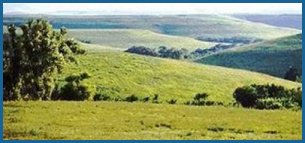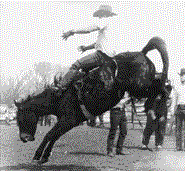
It was a cold South Dakota spring morning and I pulled up the collar of my Levi jacket against the icy drizzle. I urged my reluctant horse forward and joined the boss at the edge of the cane field where the herd was hiding out. Plunging into the cane we started herding the cows and new calves toward the far end of the cane where we would gather them up to drive back to the ranch for branding.
These black cows had been out on the prairie all winter and were half wild and as my cutting horse took a sharp turn, I thought about how they would charge a man on foot, especially with these new calves and I sat a little tighter on the saddle.
About mid morning we had the cane field pretty well cleared out and began gathering up the herd to drive home. The drizzle had gone and the morning had gone from miserable to sunny warm in a few hours and my jacket was off and sleeves rolled up as we started the trip home, the house and barn a speck on the distant horizon on the open prairie. The smell of new spring grass floated on a soft breeze ad the only sounds was the sound of hooves and a soft lowing from the herd as we moved lazily along throught this beautiful, lonely landscape.
All of a sudden there was a roar and the boss' son rode up on the dirt bike that he favored for such work, worthless in the cane, of course but good enough on this open ground. We saw the stray heifer across the creek at the same time, looked at each other and the race was on.
I raced across the open ground, bent forward in the saddle at a full gallop but the bike was pulling ahead easily. We came to a ravine and the horse and I plunged down in a series of jerks and skids and I leaned back, planting my feet firmly in the stirrups and hanging on to the saddle horn with one hand and the reins with the other.
As we raced to the other side of the creek bed, the bike and horse were side by side. On the far side my brave mare went straight up the bank digging into the soft dirt and dragging us both up and over the top. Behind me I heard the bike stall and stop and a cloud of curses fill the air as I swung the heifer around and headed her back toward the herd.
The day may come when machines replace horses on the prairie but that day was not to be today.

It was a Saturday night a lot like most. I’d worked a half day and after cleaning up and putting on my best “go to town” clothes the boss had driven me into Winner, South Dakota. I had my $50 wages for the week, the going rate for ranch hands in the 1970’s and I was ready to spend it all.
First I checked into Ella Peashaw’s Hotel so my room would be paid for and within minutes I was headed for the bar, a few doors down. I went to the Indian bar this week. As a white guy I could drink either there or in the cowboy bar further up-town, but I’d been seeing a pretty Sioux girl, named Theresa, for a while so I was spending more time with the Indians these days.
The evening went as usual for a Saturday night. The bar was a dingy little place, with plywood over the windows and sawdust on the floor, loud and wild and just the way I liked it. Theresa and I put away our share of beer and danced to the juke box and dodged the fights that started a little later and settled down to the bar talks that started after the fighters staggered away or passed out as the evening wore on.
I was at the bar with several Indian men talking horses and the talk turned to broncos and bulls and rodeos. Several of the men were rodeo riders, including Frank, Theresa’s old boyfriend and he bragged enough that I finally felt the need to say that I could ride any horse they could come up with.
Now there was no real reason to say that as my bronco experience was limited to settling down horses that had spent all winter out to pasture and though some of these were feisty enough, they weren’t rodeo grade at all. I saw them smiling at me and soon we were on our way out toward the reservation in a little caravan of two cars and a pickup truck for a Saturday Night Barnyard Rodeo.
The corral was lit up with outside spotlights to light the long hours of Spring roundup and branding so it had the feel of an arena as they led the saddled-up horse to the rail. I looked over the horse and he did not look exceptional but I knew that looks had nothing to do with it. Many ranches had an outlaw or two, horses that would go wild each year when put out to pasture. Winter work on these ranches is light due to the blizzards that make the outer pastures snow-bound much of the time. The cattle and most of the horses are left pretty much alone over the winter months and often get a little wild in that time. I figured this was their outlaw.
I’d figured right and they’d no sooner turned us loose than I saw myself hurdling in slow motion toward the back fence of the corral, which was three strands of barbed wire. I landed in the fence having only lasted two bucks and I crumpled into a bleeding pile as the laughter rose from the far rail.
A few minutes later I was being fed coffee by an old Indian woman who had ridden out with us from town with her husband. I did not know her but I guessed her to be in her seventies at least. It was hard to judge as many of the reservation Indians lived hard lives and their faces often settle into a weathered old age in their fifties. Her long skirt gave her away to be older, a dress style maybe from one of the old mission schools early in the century.
The old man said something in Sioux and Theresa, looking anxiously on, translated that he was saying I wasn’t hurt too bad and should try again and if I could keep the horses head down I’d be OK. I wasn’t too surprised at him speaking Sioux, some of the older people had English beaten into them as children at the reservation schools and refused to speak it now out of spite. Many of the people of this age had fathers who’d fought Custer at the Little Bighorn and relatives who’d been at the Wounded Knee massacre so they knew intimately the story of the fall of their People. Many of these older folks had little use for white men.
Frank and the others had caught the horse and had him at the rail, they were still laughing but quieter now and Frank called over to ask if I’d had enough. I was sore and bleeding from a wicked barbed wire gash on my elbow and pretty much covered in dust but I finished my coffee and said OK and headed for the rail.
I sat down tight as I could on the saddle, my head was a little clearer from the adrenaline and coffee and I nodded to the two guys holding the reins to let go. The horse went straight up into the air and came down hard and immediately twisted to the right in an upward turn. I was still on and began pulling back on the reins to try to get his head down. Straight up again and another spin and across the corral we went, and this time I stayed on, legs and arms flying in all directions and out of the saddle more than in… not pretty, but still riding.
Finally I felt the bucking slow a bit and there was just the briefest pause between jumps and I pulled the rein to one side and down and he turned his head, spinning for a second in a tight circle. Then I pulled both reins back and his head was down, he stopped cold.I eased up just a bit and he walked a couple of steps. Then I took a big chance and let go the reins and dug my heels into his flanks and away we went at a gallop and I rode around the corral twice and up to the rail, stopping in front of Theresa with a spin and a flourish. I got off the horse and handed the reins to Frank and watched his face cloud over and his eyes flared and I figured we’d fight. I did not relish the prospect because he was a thin, wiry, tough, man known for winning fights. No matter, I was hurting already so a little more wouldn't matter.
Then I heard the old woman say something in Sioux and all their expressions changed and Frank shrugged and started walking the now docile horse to the gate. Theresa looked at the old couple for a minute and turned to me and translated quietly. They have given you a name. Then she repeated what the old woman had said. It means “ The Cowboy with Work Shoes On” and I looked down at the sturdy brown work boots I favored over cowboy boots. Theresa went on to say that the old people never named a white man unless they respected him and the term “cowboy” was more of a title than a word in Sioux. I looked over at them and said, “Thank you.”
“Good ride.” The old man said in English, “You follow directions OK”, and he laughed.
Riding back into town, holding Theresa’s hand I thought about the night and the look in Theresa’s eyes as I’d ridden up and about my new name and decided that my prize that night was better than any cowboy's Silver Buckle ever won in a rodeo arena.
